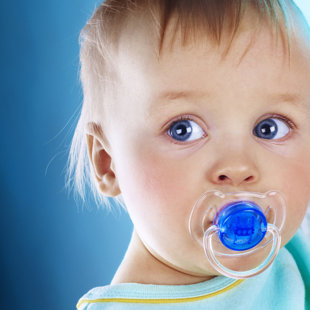Popping a binky in a baby's mouth is a quick way to stop them from fussing, but for boys, it may also short-circuit their emotional growth.
Popping a binky in a baby's mouth is a quick way to stop them from fussing, but for boys, it may also short-circuit their emotional growth.
Read More: 10 Simple Ways to Boost Kid's Self-Esteem
Before a baby can talk, he or she relies on non-verbal cues, especially facial expressions, to communicate. Babies also mirror those cues, and in so doing, discover the emotions the cues are attached to. In a recent study published in the Journal of Basic and Applied Social Psychology researchers from the University of Wisconsin scientists evaluated over 100 kids and found that that six and seven-year-old boys who had heavily used pacifiers were worse at mimicking emotions expressed by faces on a video. They also interviewed more than 600 college students and discovered that college-age men whose parents reported they had relied on pacifiers scored lower on tests measuring empathy and the ability to evaluate the moods of others. For girls and young women, the researchers found there was no difference in emotional maturity based on pacifier use.
Related: Baby Bottles, Sippy Cups, Pacifiers, Can Injure
"Females tend to be more precise both in both expressing and reading emotional cues," lead author Paula Niedenthal, PhD, tells Shine. "We don't exactly know how that occurs. One reason might be that be that society encourages girls to read emotions. They might work harder at it." She adds, "Parents talk to girls about emotional processing more than they do to boys. That's not a revolutionary statement." Since boys aren't expected to be as emotional, parents may not compensate for pacifier use by helping them learn in other ways.
Read More: 10 Simple Ways to Boost Kid's Self-Esteem
Before a baby can talk, he or she relies on non-verbal cues, especially facial expressions, to communicate. Babies also mirror those cues, and in so doing, discover the emotions the cues are attached to. In a recent study published in the Journal of Basic and Applied Social Psychology researchers from the University of Wisconsin scientists evaluated over 100 kids and found that that six and seven-year-old boys who had heavily used pacifiers were worse at mimicking emotions expressed by faces on a video. They also interviewed more than 600 college students and discovered that college-age men whose parents reported they had relied on pacifiers scored lower on tests measuring empathy and the ability to evaluate the moods of others. For girls and young women, the researchers found there was no difference in emotional maturity based on pacifier use.
Related: Baby Bottles, Sippy Cups, Pacifiers, Can Injure
"Females tend to be more precise both in both expressing and reading emotional cues," lead author Paula Niedenthal, PhD, tells Shine. "We don't exactly know how that occurs. One reason might be that be that society encourages girls to read emotions. They might work harder at it." She adds, "Parents talk to girls about emotional processing more than they do to boys. That's not a revolutionary statement." Since boys aren't expected to be as emotional, parents may not compensate for pacifier use by helping them learn in other ways.


Comments
Post a Comment